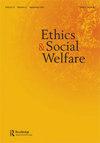The Conundrum of Corruption During a Coronavirus Lockdown in Zimbabwe: Lessons for Social Work
IF 0.9
Q4 SOCIAL WORK
引用次数: 0
Abstract
ABSTRACT Faced with the serious threat of the deadly coronavirus, governments of different nations were swift to respond to the pandemic by declaring national lockdowns. Having confirmed fewer than ten cases of coronavirus that had tested positive, Zimbabwe called for a national lockdown which initially lasted three weeks before declaring it ‘indefinite’. Despite the fact that the lockdown declared in Zimbabwe was in the interest of public health, anecdotal evidence indicates that there has been an inextricable nexus between the lockdown and increased corrupt tendencies. This paper, which is a product of qualitative research, utilised a narrative research approach and documentary analysis to explicate the relationship between Zimbabwe’s coronavirus lockdown and corruption. The paper looks at the different forms of corruption that occurred during the coronavirus lockdown in Zimbabwe and the implication of these on the well-being and welfare of economically vulnerable groups. In conclusion, the paper indicates the role that can be played by pro-human rights professionals such as social workers in the fight against corruption during emergency times to ensure transparency and accountability.津巴布韦冠状病毒封锁期间的腐败困境:社会工作的教训
摘要面对致命的冠状病毒的严重威胁,各国政府迅速宣布全国封锁,以应对疫情。津巴布韦确诊的冠状病毒检测呈阳性的病例不到10例,因此呼吁全国封锁,最初持续三周,然后宣布“无限期”封锁。尽管津巴布韦宣布的封锁符合公共卫生利益,但传闻证据表明,封锁与腐败倾向的增加之间存在着不可分割的联系。本文是定性研究的产物,采用叙事研究方法和文献分析来解释津巴布韦的冠状病毒封锁与腐败之间的关系。该论文着眼于津巴布韦新冠疫情封锁期间发生的不同形式的腐败,以及这些腐败对经济弱势群体福祉的影响。最后,该文件指出了社会工作者等支持人权的专业人员在紧急时期反腐败斗争中可以发挥的作用,以确保透明度和问责制。
本文章由计算机程序翻译,如有差异,请以英文原文为准。
求助全文
约1分钟内获得全文
求助全文
来源期刊

Ethics and Social Welfare
SOCIAL WORK-
CiteScore
1.60
自引率
20.00%
发文量
36
期刊介绍:
Ethics and Social Welfare publishes articles of a critical and reflective nature concerned with the ethical issues surrounding social welfare practice and policy. It has a particular focus on social work (including practice with individuals, families and small groups), social care, youth and community work and related professions. The aim of the journal is to encourage dialogue and debate across social, intercultural and international boundaries on the serious ethical issues relating to professional interventions into social life. Through this we hope to contribute towards deepening understandings and further ethical practice in the field of social welfare. The journal welcomes material in a variety of formats, including high quality peer-reviewed academic papers, reflections, debates and commentaries on policy and practice, book reviews and review articles. We actively encourage a diverse range of contributions from academic and field practitioners, voluntary workers, service users, carers and people bringing the perspectives of oppressed groups. Contributions might include reports on research studies on the influence of values and ethics in social welfare practice, education and organisational structures, theoretical papers discussing the evolution of social welfare values and ethics, linked to contemporary philosophical, social and ethical thought, accounts of ethical issues, problems and dilemmas in practice, and reflections on the ethics and values of policy and organisational development. The journal aims for the highest standards in its published material. All material submitted to the journal is subject to a process of assessment and evaluation through the Editors and through peer review.
 求助内容:
求助内容: 应助结果提醒方式:
应助结果提醒方式:


